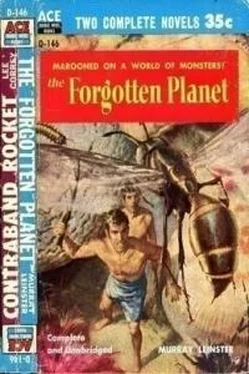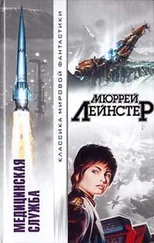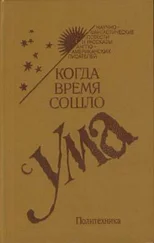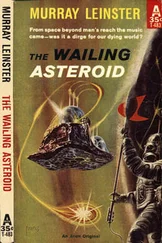He moved onward. Despite his caution, his shoulder once touched a cream–colored toadstool stalk, giving the whole fungus a tiny shock. Instantly a fine and impalpable powder fell upon him from the umbrella like top above. It was the season when the toadstools sent out their spores. He paused to brush them from his head and shoulders. They were, of course, deadly poison.
Burl knew such matters with an immediate and specific and detailed certainty. He knew practically nothing else. He was ignorant of the use of fire, of metals, and even of the uses of stone and wood. His language was a scanty group of a few hundred labial sounds, conveying no abstractions and few concrete ideas. He knew nothing of wood, because there was no wood in the territory furtively inhabited by his tribe. This was the lowlands. Trees did not thrive here. Not even grasses and tree–ferns could compete with mushrooms and toadstools and their kin. Here was a soil of rusts and yeasts. Here were toadstool forests and fungus jungles. They grew with feverish intensity beneath a cloud–hidden sky, while above them fluttered butterflies no less enlarged than they, moths as much magnified, and other creatures which could thrive on their corruption.
The only creatures on the planet which crawled or ran or flew—save only Burl's fugitive kind—were insects. They had been here before men came, and they had adapted to the planet's extraordinary ways. With a world made ready before their first progenitors arrived, insects had thriven incredibly. With unlimited food–supplies, they had grown large. With increased size had come increased opportunity for survival, and enlargement became hereditary. Other than fungoid growths, the solitary vegetables were the sports of unstable varieties of the plants left behind by the Ludred . There were enormous cabbages, with leaves the size of ship–sails, on which stolid grubs and caterpillars ate themselves to maturity, and then swung below in strong cocoons to sleep the sleep of metamorphosis. The tiniest butterflies of Earth had increased their size here until their wings spread feet across, and some—like the emperor moths—stretched out purple wings which were yards in span. Burl himself would have been dwarfed beneath a great moth's wing.
But he wore a gaudy fabric made of one. The moths and giant butterflies were harmless to men. Burl's fellow tribesmen sometimes came upon a cocoon when it was just about to open, and if they dared they waited timorously beside it until the creature inside broke through its sleeping–shell and came out into the light.
Then, before it gathered energy from the air and before its wings swelled to strength and firmness, the tribesmen fell upon it. They tore the delicate wings from its body and the still–flaccid limbs from their places. And when it lay helpless before them they fled away to feast on its juicy meat–filled limbs.
They dared not linger, of course. They left their prey helpless—staring strangely at the world about it through its many–faceted eyes—before the scavengers came to contest its ownership. If nothing more deadly appeared, surely the ants would come. Some of them were only inches long, but others were the size of fox–terriers. All of them had to be avoided by men. They would carry the moth–carcass away to their underground cities, triumphantly, in shreds and morsels.
But most of the insect world was neither so helpless nor so unthreatening. Burl knew of wasps almost the length of his own body, with stings that were instantly fatal. To every species of wasp, however, some other insect is predestined prey. Wasps need not be dreaded too much. And bees were similarly aloof. They were hard put to it for existence, those bees. Since few flowers bloomed, they were reduced to expedients that once were considered signs of degeneracy in their race: bubbling yeasts and fouler things, or occasionally the nectarless blooms of the rank giant cabbages. Burl knew the bees. They droned overhead, nearly as large as he was, their bulging eyes gazing at him and everything else in abstracted preoccupation.
There were crickets, and beetles, and spiders…. Burl knew spiders! His grandfather had been the prey of a hunting tarantula which had leaped with incredible ferocity from its tunnel in the ground. A vertical pit, a yard in diameter, went down for twenty feet. At the bottom of the lair the monster waited for the tiny sounds that would warn him of prey approaching his hiding–place.
Burl's grandfather had been careless. The terrible shrieks he uttered as he was seized still lingered vaguely in Burl's mind. And he had seen, too, the webs of another species of spider—inch–thick cables of dirty silk—and watched from a safe distance as the misshapen monster sucked the juices from a three–foot cricket its trap had caught. He remembered the stripes of yellow and black and silver that crossed upon its abdomen. He had been fascinated and horrified by the blind struggling of the cricket, tangled in hopeless coils of gummy cord, before the spider began its feast.
Burl knew these dangers. They were part of his life. It was this knowledge that made life possible. He knew the ways to evade these dangers. But if he yielded to carelessness for one moment, or if he relaxed his caution for one instant, he would be one with his ancestors. They were the long–forgotten meals of inhuman monsters.
Now, to be sure, Burl moved upon an errand that probably no other of his tribe would have imagined. The day before, he had crouched behind a shapeless mound of inter–tangled growths and watched a duel between two huge horned beetles. Their bodies were feet long. Their carapaces were waist–high to Burl when they crawled. Their mandibles, gaping laterally, clicked and clashed upon each other's impenetrable armor. Their legs crashed like so many cymbals as they struck against each other. They fought over some particularly attractive bit of carrion.
Burl had watched with wide eyes until a gaping hole appeared in the armor of the smaller one. It uttered a grating outcry—or seemed to. The noise was actually the tearing of its shell between the mandibles of the victor.
The wounded creature struggled more and more feebly. When it ceased to offer battle, the conqueror placidly began to dine before its prey had ceased to live. But this was the custom of creatures on this planet.
Burl watched, timorous but hopeful. When the meal was finished, he darted in quickly as the diner lumbered away. He was almost too late, even then. An ant—the forerunner of many—already inspected the fragments with excitedly vibrating antennae.
Burl needed to move quickly and he did. Ants were stupid and short–sighted insects; few of them were hunters. Save when offered battle, most of them were scavengers only. They hunted the scenes of nightmare for the dead and dying only, but fought viciously if their prey were questioned. And always there were others on the way.
Some were arriving now. Hearing the tiny clickings of their approach, Burl was hasty. Over–hasty. He seized a loosened fragment and fled. It was merely the horn, the snout of the dead and eaten creature. But it was loose and easily carried. He ran.
Later he inspected his find with disappointment. There was little meat clinging to it. It was merely the horn of a Minotaur beetle, shaped like the horn of a rhinoceros. Plucking out the shreds left by its murderer, he pricked his hand. Pettishly, he flung it aside. The time of darkness was near, so he crept to the hiding place of his tribe to huddle with them until light came again.
There were only twenty of them; four or five men and six or seven women. The rest were girls or children. Burl had been wondering at the strange feelings that came over him when he looked at one of the girls. She was younger than Burl—perhaps eighteen—and fleeter of foot. They talked together sometimes and, once or twice, Burl shared an especially succulent find of foodstuffs with her.
Читать дальше







